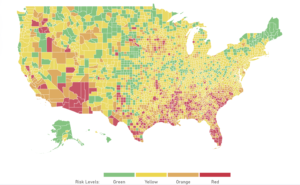It now seems that I now need to keep doing a weekly linkfest solely dedicated to the coronavirus pandemic. You can read last week’s edition here. Please be careful and stay safe.
Quote of the day
Tim Harford, “We do learn from bitter experience, of course. But we also have a great talent for forgetting. In particular, we forget how bad things feel. The pandemic will long be remembered, but the pain will fade.” (FT)
Chart of the day

COVID Risk Levels Dashboard (by county) as of July 2, 2020. (HGHI)
Masks
Cullen Roche, “So, there’s your trade of the year – if you want life to return to normal and the economy to recover then do your part and wear a mask when you might expose other people to the virus and ignore all the political bias around this issue. It’s just silliness.” (Pragmatic Capitalism)
Universal masking works. Why some countries have been slow to get the message. (WSJ)
Why valved masks don’t do as good a job at preventing the spread of the coronavirus. (Washington Post)
Why some men refuse to wear face masks (Scientific American)
Refusing to wear a mask is akin to drunk driving. (NYTimes)
Fred Wilson, “I can’t think of anything simpler and more powerful that we can all do other than wearing a mask.” (A VC)
Testing
We need a lot more testing to move from mitigation to suppression. (NPR)
We need to be testing more asymptomatic people. (Fast Company)
Sustainable jobs growth will only come with ubiquitous testing. (PBS)
Actions
The future of the pandemic is within the hands of the population. (The Conversation)
Simple tools can help us combat the virus. (Tim Harford)
Social distancing is a lot easier for the wealthy. (The Atlantic)
Data
Herd immunity means different things in different populations at different times. (Quanta)
Death rates in UK hospitals are steadily falling. (Marginal Revolution)
What percentage of excess US deaths have been officially attributed to Covid-19? (Econbrowser)
How the Sun Belt outbreak differs from New York City’s. (Bloomberg)
What you miss when you focus on the overall coronavirus data. (Washington Post)
Science
A seemingly small mutation in the coronavirus may have allowed it to spread more quickly and widely. (Washington Post)
Better air handling is going to be a part of (office) buildings in the post-pandemic future. (FT)
Why do some people spread the coronavirus to so many others? (NYTimes)
The pandemic shows the need to open up scientific journals. (Bloomberg)
Vaccines
The FDA has established the criteria by which it will judge Covid-19 vaccines. (Washington Post)
Some encouraging data from a Pfizer ($PFE) trial. (STAT)
Prior to the pandemic, Moderna ($MRNA) was struggling. Now it’s at the center of the narrative (WSJ)
Tesla ($TSLA) is going to make ‘molecule printers’ for vaccine-maker CureVac. (Reuters)
Treatments
There is still no consensus among doctors on how to treat critical Covid-19 patients. (WSJ)
We are learning more about how the coronavirus attacks the immune system. (NYTimes)
The story of how a novel anti-viral medication made into clinical trials so quickly. (FT)
The FDA has been quick with emergency approvals but needs to follow up to maintain safety. (The Incidental Economist)
Mass transit
How social distancing is changing mass transit around the world. (WSJ)
Racial disparities are due in part to mass transit use. (WSJ)
Bars and Restaurants
Just how safe is outdoor dining (and drinking)? (Vox)
What makes bars and restaurants such coronavirus hot spots. (WSJ)
If you want the rest of the economy to reopen keep the bars closed for now. (New York)
Six health experts polled – none of them would eat inside a restaurant right now. (Washington Post)
Travel
The safest ways to travel this summer without getting (or spreading) the coronavirus. (Vox)
This Italian town had no coronavirus cases. Now the country is open to visitors. (Washington Post)
Families are having a hard time getting on the same page when it comes to coronavirus precautions. (WSJ)
Side effects
Opioid overdoses are on the rise in pandemic. (Washington Post)
The gender wage gap is going to be exacerbated by the pandemic. (NPR)
Americans are shunning currency in pandemic. (Axios)
Psychology
We are being forced to figure out the risks of various activities on our own. (The Atlantic)
How the pandemic may have permanently/negatively changed expectations about these type of events. (NBER)
The pandemic has put our collective cognitive dissonance into overdrive. (Nautilus)
Earlier on Abnormal Returns
Coronavirus links: risk minimization. (Abnormal Returns)
Coronavirus links: lessons not learned. (Abnormal Returns)
Coronavirus links: just wear a mask. (Abnormal Returns)
Coronavirus links: reopening and relapsing. (Abnormal Returns)
Coronavirus links: testing and safety. (Abnormal Returns)
Acceptable risks in a world full of uncertainty. (Abnormal Returns)
Having no plan is just as bad as not following the plan you have. (Abnormal Returns)








